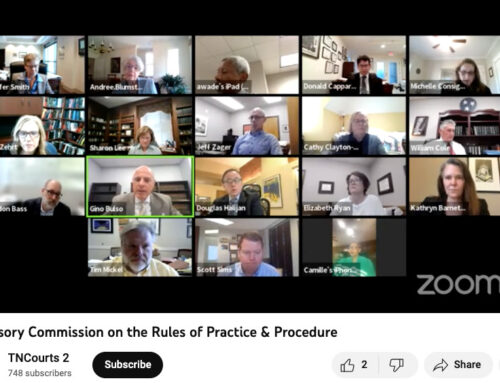AG opinion says public hospital boards can’t meet privately on compensation
Attorney General Herbert Slatery issued an opinion yesterday that public hospital boards do not have an exemption to the Open Meetings Act that allows them to meet privately to discuss executive compensation or executive bonuses.
The Chattanooga Times Free Press is following the story today, and has reported on the controversy that ensued after what appeared to be private meetings to discuss or decide to give executives $1.7 million in bonuses. The board held a public vote on the bonuses, but only after adding the item to the agenda at the last minute, after the private meetings, and without advance notice.
State Rep. Mike Carter, R-Ooltwah, asked the AG for an opinion. The hospital board has maintained that its lawyers say what it did was OK.
Slatery’s opinion, however, says that a public hospital board has restrictions on what it can do in private meetings under the Sunshine Law. Here is an excerpt from the AG opinion:
QUESTIONS
1. Whether the provisions of Tenn. Code Ann. S 68-11-238 would permit the board of a public hospital to meet in closed session to discuss executive compensation and executive bonuses?
2. Whether Tenn. Code Ann. S 63-11-238 requires records to be kept of all issues discussed and/or decided in a closed meeting?
3. When must records from a closed meeting under Tenn. Code Ann. S 68-11-238 be made available for public inspection?
4. Does Tenn. Code Ann. S 68-11-238 require a minimum of seven days between a closed meeting and a public vote to adopt a particular plan or strategy?
OPINIONS
1. Tenn. Code Ann. S 63-11-238(a) would not permit the board of a public hospital that is subject to the Tennessee Open Meetings Act and Tennessee Public Records Act to meet in closed session to discuss executive compensation and executive bonuses.
2. and 3. Tenn. Code Ann. S 68-11-238 does not require that any records be kept in a closed meeting held pursuant to the provisions of the statute. If, however, studies are considered by the board in the adoption of a specific marketing stratery or plan, those studies shall be made available for public inspection at least seven days before any public meeting of the board to adopt the strategy or plan.
4. In the event that there are studies that were considered by the board in the adoption of a particular marketing strategy or plan, then the statute would require a minimum of seven days between the closed meeting and a public vote to adopt that particular plan or strategy in order to make the studies available for public inspection during the seven-day time period required by subsection (a) of the statute. Any meeting of the board to adopt a specific plan or strategy must still comply with the Tennessee Open Meetings Act, including the notice provisions. If, however, no such studies were considered by the board, the seven-day time period for inspection is not applicable.
Slatery’s opinion explains why the exemption does not cover discussion of compensation issues:
You have asked whether the provisions of Tenn. Code Ann. S 68-11-238 would allow the board of a public hospital to meet in closed session in order to discuss executive compensation and executive bonuses. The plain language of the statute only authorizes the board of a public hospital to meet in a closed session to “discuss and develop marketing strategies and strategic plans.
…
The term “marketing” is commonly defined as “[t]he act or process of promoting and selling, leasing, or licensing products or services.” Black’s Law Dictionary (8th ed.) at 990. The term “strategy” is commonly defined as “a careful plan or method for achieving a particular goal usually over a long period of time.” Based on these definitions, it is apparent that the legislature intended the confidentiality provisions of Tenn. Code Ann. S 68-11-238(a) to apply to a public hospital’s discussion and development of its long-term plans for promoting the products and services of the hospital and not the determination of executive compensation and executive bonuses. This construction is further supported by the legislative history, which reflects that the intent of this statute was to allow public hospitals to compete with private hospitals by allowing them to conduct their business development meetings in a closed session. Accordingly, the board of a public hospital could not use the provisions of Tenn. Code Ann. S 68-11-238 to conduct a closed session for the purposes of discussing executive compensation and executive bonuses.




